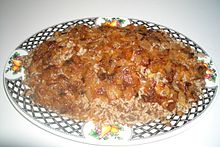Mujaddara

A style of Mujaddara
|
|
| Course | Meal |
|---|---|
| Place of origin | the Levant |
| Region or state | Iraq, Israel, Jordan, Lebanon, Palestine and Syria |
| Main ingredients | Rice or bulgur, lentils, onions |
| |
|
Mujaddara (Arabic: مجدرة mujadarah, with alternative spellings in English majadra, mejadra, moujadara, mudardara, and megadarra) consists of cooked lentils together with groats, generally rice, and garnished with sautéed onions.
Mujaddara is the Arabic word for "pockmarked"; the lentils among the rice resemble pockmarks. The first recorded recipe for mujaddara appears in Kitab al-Tabikh, a cookbook compiled in 1226 by al-Baghdadi in Iraq. Containing rice, lentils, and meat, it was served this way during celebrations. Without meat, it was a medieval Arab dish commonly consumed by the poor, reputed to be a derivative of the "mess of pottage" Jacob used to buy Esau's birthright. Because of its importance in the diet, a saying in the Eastern Arab world is, "A hungry man would be willing to sell his soul for a dish of mujaddara."
Cooked lentils are popular all over the Middle East and form the basis of many dishes. Mujaddara is a popular dish throughout the Arab world, and is generally made using brown or green lentils and rice, that can be seasoned with cumin, coriander, or mint. It is topped with fried onions and is generally served with yogurt, among other vegetables and side dishes, either hot or cold.
The dish, made with brown lentils and rice, is known as mudardara in Lebanon, where it is commonly topped with caramelized onions and served with yogurt. In Lebanon, the word mjaddara is often used to describe the puréed version of the dish, rather than the version with whole grains and lentils.
Particularly in Palestine, rice is often replaced with bulgur; the dish is called M'jaddaret-Burghul to distinguish it from the M'jaddara which is served with rice. Pronounced as M'jaddara, the meal is served multiple times a month for family, cooked with olive oil and onion strips, and served alongside local plain sheep yogurt (known as Laban N'aj) that is traditionally made in Nablus, with green salad. The meal is almost never served to guests.
...
Wikipedia
